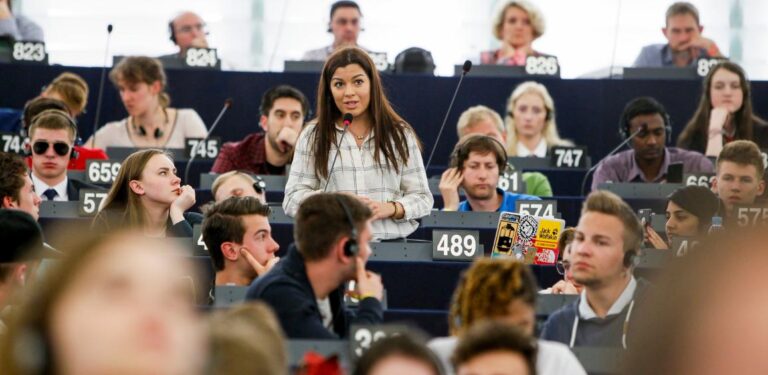
The Conference on the future of Europe should be convened by the end of the year. The President of the European Commission, Ursula von der Leyen, announced it in her inaugural speech and the European Parliament recently urged that it be convened before the end of 2020 (Resolution of 18/6/20). Yet some unexpected obstacles risk drastically reducing the significance of the Conference.
At present, the main issue is the European Parliament’s proposal to entrust the presidency of the Conference to Guy Verhofstadt, who for years has been fighting for a democratic and federal reform of the Union. Various members of the European Council have flatly opposed this proposal. An article in Politico (De La Baume, 13/10) reports: “Verhofstadt was considered a nonstarter by a number of governments in the Council”, due to the fact that he is seen as a “champion of European federalism”. The hunt for alternative candidates is currently under way.
We can only surmise that in Europe it is legitimate to be a liberal, democratic, socialist, green or sovereignist, just as long as you are not a federalist. Yet if this view prevails, the Conference will be dead in the water. Obstructing the European Parliament without a serious reason for doing so is an insult to European democracy: the European Parliament is the only body legitimized by the popular vote, something that the Council lacks. Nevertheless, sovereignist governments are intent on drastically narrowing the political horizons of the debate. They want to rule out any discussion of European federalism in advance, despite the fact that President Macron, when proposing the Conference, called for a debate “without taboos”. Evidently, however, some issues remain taboo.
Yet European democracy and European federalism are two sides of the same coin. In this dramatic year, with the pandemic, many significant proposals for European citizens drafted by the Commission and Parliament have been blocked by means of the unanimity vote in the Council (the dispute over the budget is a case in point): a small minority of countries and population circumventing the vast majority. It is the tyranny of the minority. If we want to get past this impasse, we need to look to the lessons of the federalist thought (which dates back to Immanuel Kant and Alexander Hamilton), because the principles of federalism can help disentangle the problem.
It should nonetheless be noted that looking to existing federal states is of little help. To date, federalism has regarded sovereign nation states (such as the USA, Canada, India, Australia, Switzerland, etc.) thus becoming – in contemporary political culture – a mechanism for administrative decentralization. In Europe, on the contrary, the founding fathers designed the first institutions, the ECSC and the European Economic Community (EEC), as a “work in progress” towards a federal union. The Schuman Declaration is very clear on this. To overcome the current obstacles it would be useful to take a step towards supranational federalism. European federalism will be different from all existing federal systems. Not all competences and powers of national governments will have to be assigned to Europe, contrary to what sovereignist forces assert, including those governments that reject the ideals of the very institutions they benefit from. The criterion of the vertical division of powers applies to policies for trade, taxation, security, defence, the environment, health etc.
I do not intend to enter into a debate that will have to be conducted by the representatives of European citizens in the Conference. I merely wish to note that the Union faces internal and international challenges that call for urgent structural reforms. Issues like immigration, European security, the atomic rearmament of the major powers and the proliferation of weapons of mass destruction, the development of the new information technologies, environmental disasters and pandemics cannot be tackled on a national level, but require a capacity for European action, at the federal level.
Without policies befitting the importance of the issues at stake, there will be no cohesion between European citizens and the Union will remain weak. A political community cannot exist without common ideals, a shared identity and effective policies. Some indications for how to proceed in this direction have already been provided by Josep Borrell in his message to the United Nations: “The EU Stands with the UN” (Project Syndicate, Sept. 22). Borrell asserts: “A world governed by agreed rules is the very basis of our shared security, freedoms, and prosperity. A rule-based international order makes states secure, keeps people free and companies willing to invest, and ensures that the Earth’s environment is protected. The alternative – might makes right – has been tried for most of human history, and its horrific record is the best argument for the multilateral system. Unfortunately, it is increasingly being tried again, with the results visible to all. This is not the approach of the EU. We will continue to believe in and support the UN”.
The EU’s role in the world will be one of the crucial themes of the Conference on the future of Europe. Today’s young people are concerned about the future of life on our planet and are asking government leaders for a bolder policies to combat the pollution of the biosphere and construct a peaceful world. The EU has no future if the planet has no future.
The politicians in the European Council who want to exclude the prospect of a democratic and supranational Europe from the debate should explain to young people why it is better to remain closeted inside national borders.